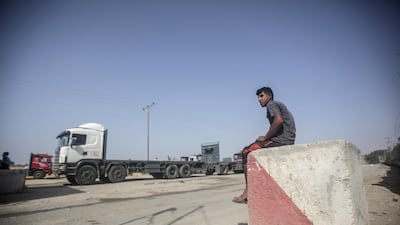Israel has ordered the reopening of its border crossings, one for people and one for goods, with Gaza, just days after closing them because of a Palestinian rocket attack that resulted in retaliatory strikes.
The move came as Egypt also opened its Rafah border crossing with Gaza, which it has done for several days every week since May to ease the humanitarian crisis and help scores of Gazans wounded by Israeli sniper fire as they protested against the years-long siege on the enclave.
It had largely kept the border crossing closed after the overthrow of Hamas-backed Muslim Brotherhood leader Mohamed Morsi from power in 2013. But relations between Cairo and the movement has thawed somewhat since.
The moves followed efforts to prevent an escalation in violence that has raised fears of a new war between Israel and the Palestinian territory's rulers Hamas.
"The decision comes after a decrease in the violent events in Gaza over the weekend and efforts Hamas made to restrain" demonstrators, Defence Minister Avigdor Lieberman's office said in a statement.
Hamas disavowed the launches and said it was investigating the incident, as alarm over a potential broader conflict rose.
But Israel rejected their denial, saying they were the only groups armed with rockets of that range.
Israel in any case holds Hamas responsible, as Gaza's de facto rulers, for all fire from the territory regardless of who launches it.
The crossings represent the only two routes for Gazans in and out of the territory by land.
Hamas interior ministry spokesman Iyad Al Bozum said there is currently a list of thousands of Gazans waiting to exit the Strip, who are notified online when their turn comes. Only several hundred can leave a week, out of around two million people who live in the occupied territory.
Israel had already suspended fuel deliveries to the strip earlier this month, citing attempted border breaches and flaming balloons crossing into its territory.
A decision on renewed fuel deliveries "has been put off as for the time being and will be examined in a number of days based on events", Mr Lieberman's office said Sunday.
The UN has warned that Gaza may become unlivable by 2020 as restrictions continue to batter the strip’s economy, leaving it with the highest unemployment rates in the world.
On Friday, UN envoy Nickolay Mladenov urged all sides "to exercise restraint, to proceed in a peaceful manner, and to avoid escalation".
Hamas and Israel have fought three wars since 2008 and increased tensions have raised concerns that a fourth could break out at any moment. The escalation has pushed Egypt and the UN into a flurry of diplomacy in a bid to broker a long-term truce between the two parties.

